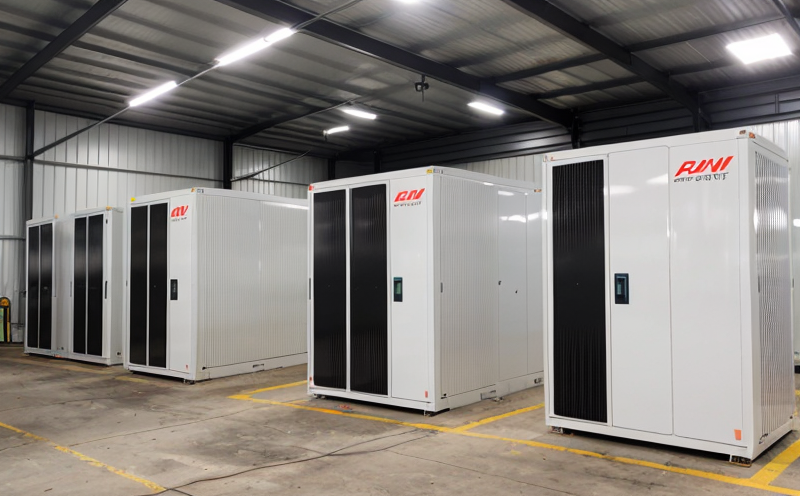IEC 60952 Performance Testing of Aircraft Batteries
The International Electrotechnical Commission (IEC) standard IEC 60952 is a globally recognized specification for the performance testing of aircraft batteries. This service ensures that batteries meet stringent safety and operational reliability standards, which are critical for aviation applications.
Aircraft batteries play a crucial role in ensuring flight safety by providing power during emergencies such as engine failure or loss of electrical supply from the main generators. These batteries must be robust enough to deliver high performance under various conditions, including extreme temperatures and mechanical stress. The IEC 60952 standard provides a framework for testing these batteries to ensure they meet all necessary specifications.
The testing process involves several stages, each aimed at evaluating different aspects of battery performance. Initially, the battery is subjected to environmental tests to assess its resistance to temperature variations and humidity levels that it might encounter during flight. This stage also includes a mechanical stress test to evaluate how well the battery withstands physical impacts.
Following the environmental testing, electrical performance checks are conducted using specialized equipment designed specifically for this purpose. These checks include voltage drop measurements, internal resistance assessments, and capacity tests under various load conditions. The goal here is to ensure that the battery can deliver consistent power output throughout its operational life.
In addition to these core tests, there may also be additional protocols depending on specific requirements set by regulatory bodies or customer specifications. For example, some tests might focus on ensuring longevity and durability over multiple charge-discharge cycles, while others could involve more rigorous validation procedures for high-intensity usage scenarios like emergency lighting systems.
| Standard | Description |
|---|---|
| IEC 60952 | Performance testing of aircraft batteries. |
| AS 3187.1-2014 | Australian standard for lithium-ion cells and batteries used in aviation applications. |
- The first test involves placing the battery inside a climate chamber where it undergoes temperature cycling from -40°C to +65°C.
- Afterwards, the battery is exposed to humidity levels of 93% RH at room temperature for several hours.
The testing process not only helps manufacturers comply with regulatory requirements but also enhances overall confidence in product quality. By adhering to these rigorous standards, companies can ensure their products are safe and reliable, thus protecting both passengers and crew members.
Applied Standards
| Standard Number | Description |
|---|---|
| IEC 60952-1:2018 | Performance testing of aircraft batteries. |
| AS 3187.1-2014 | Australian standard for lithium-ion cells and batteries used in aviation applications. |
The IEC 60952 series of standards is widely recognized globally for its comprehensive approach to testing aircraft batteries. It covers various aspects including electrical performance, mechanical integrity, thermal management capabilities, and durability under extreme conditions. Compliance with these standards ensures that the tested products meet stringent quality benchmarks.
AS 3187.1-2014 specifically addresses lithium-ion cells and batteries used in aviation contexts. It provides detailed guidance on testing procedures aimed at evaluating safety features like overcharge protection, short circuit prevention measures, and thermal runaway suppression systems. This standard complements the broader IEC framework by offering more targeted recommendations for certain types of batteries commonly employed within this industry sector.
Quality and Reliability Assurance
- Educated, experienced technicians perform all tests using state-of-the-art equipment calibrated to meet international standards.
- All results are meticulously documented and stored for future reference or audit purposes.
Our commitment to quality extends beyond simply meeting regulatory requirements; we strive to exceed expectations by providing accurate, reliable data that can be used to improve product design and manufacturing processes. Our team of experts ensures every test is conducted according to best practices outlined in relevant standards like IEC 60952-1:2018.
By leveraging advanced technologies and methodologies, we deliver precise measurements and insights into potential areas for improvement. This approach helps manufacturers identify weaknesses early on so they can address them proactively rather than reactively after a failure occurs in the field.
International Acceptance and Recognition
- The IEC 60952 standard has been adopted by numerous countries around the world, including Australia through AS 3187.1-2014.
- This widespread adoption underscores its significance in ensuring consistent quality across different regions and industries.
Given that aviation technology operates under highly regulated environments worldwide, it's essential for manufacturers to adhere to internationally accepted standards like IEC 60952 when producing aircraft batteries. Our laboratory adheres strictly to these guidelines during every phase of testing, ensuring that the results are universally acceptable and compliant with global norms.
The international recognition accorded to this standard further reinforces its importance in maintaining high standards within the aviation industry. Compliance with such rigorous testing protocols instills trust among stakeholders involved in air travel, including passengers, operators, regulators, and researchers.





